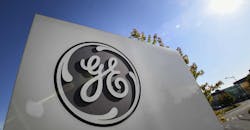Exactly one year ago, Larry Culp delivered a sobering message to General Electric Co.’s long-suffering investors. As he slashed the dividend and restructured the power business to blunt a downturn, the newly minted boss made clear their pain wasn’t over.
Today, he put forth a more encouraging prognosis, offering hints that a turnaround is finally taking hold at the once-dominant industrial giant. Just as important, he didn’t blindside investors with nasty surprises.
Instead, Culp on Wednesday raised the cash-flow forecast for its core industrial businesses while reporting quarterly earnings that topped Wall Street’s expectations. Investors responded by sending the stock toward one of its biggest gains this year, brushing aside any lingering doubts for now.
“There’s still a lot to do, it is a reset year,” the chief executive officer said in an interview. “But net-net, we’re pretty encouraged.”
Culp came to GE with a gleaming resume as an industrial guru, having boosted sales and profits at manufacturer Danaher Corp. The first outsider to become CEO of GE, Culp faced a daunting task. GE’s decline has been among the most stark in recent corporate history.
No-frills Approach
The iconic manufacturer of jet engines and medical scanners has cycled through CEOs, struggled with dwindling cash flows and mounting debt, watched its share price shrivel and even got the boot from the Dow Jones Industrial Average.
After that rocky debut last October, Culp has taken a deliberate and characteristically no-frills approach. He’s walked factory floors to identify inefficiencies and tackled outsized debt. Improvement is starting to show, he said, from operations to leverage to the reshaped portfolio.
Cash, in particular, has been a concern for investors. During the quarter, GE’s industrial businesses generated $650 million in adjusted free cash flow, above analysts’ estimates. GE now expects the manufacturing operations to generate as much as $2 billion in free cash flow this year, a billion-dollar increase from the prior projection.
The power-equipment unit has been a pain point for GE amid a global downturn in the market for gas turbines, and the business struggled with a 30% decline in third-quarter orders. Still, Culp said there’s reason for optimism, noting that its profit margins rose substantially. Fixing the ailing business has been a main priority since he took the top job.
The shares jumped 10% to $9.98 at 1:15 p.m. in New York after an earlier gain of 14%, the biggest intraday since February. GE advanced 25% this year through Tuesday, narrowly outpacing an S&P 500 index of industrial stocks.
GE is far from recovered -- the shares are still lower than when Culp took the helm -- and the company remains vulnerable to criticism. The stock plunged in August after financial investigator Harry Markopolos accused GE of accounting fraud. Markopolos, who worked with an unidentified short-seller to make the allegations, has largely retreated from the public eye in recent weeks and the shares had recovered even before Wednesday’s rally.
Culp has pushed back against the claims, calling them “market manipulation, pure and simple.”
‘Notably Better’
Third-quarter adjusted earnings rose to 15 cents a share, GE said, topping the 12-cent average of analysts’ estimates compiled by Bloomberg. Sales in the manufacturing businesses rose 7% on an organic basis.
“At the margin, most of the news is in line or notably better than expected,” said Nicholas Heymann, an analyst with William Blair & Co. “There’s not a lot to complain about.”
Even the seemingly big negatives -- an $8.7 billion charge related to GE’s sale of a stake in Baker Hughes, a $1 billion charge due to difficulties in an insurance business, a cash headwind from the grounding of Boeing Co.’s 737 Max -- were shrugged off by investors. As analysts noted, GE had flagged the issues in advance and didn’t surprise shareholders with worse-than-expected results.
Perhaps the surest sign that GE’s quarter hit the mark came from one of the company’s biggest critics, who found little to fault in the figures.
“There is not much controversy here,” said Steve Tusa, a JPMorgan Chase & Co. analyst who recommends selling the shares. There were “some puts and takes but probably received as better than feared, and the stock should recoup some of its recent under-performance.”
About the Author
Bloomberg
Licensed content from Bloomberg, copyright 2016.
